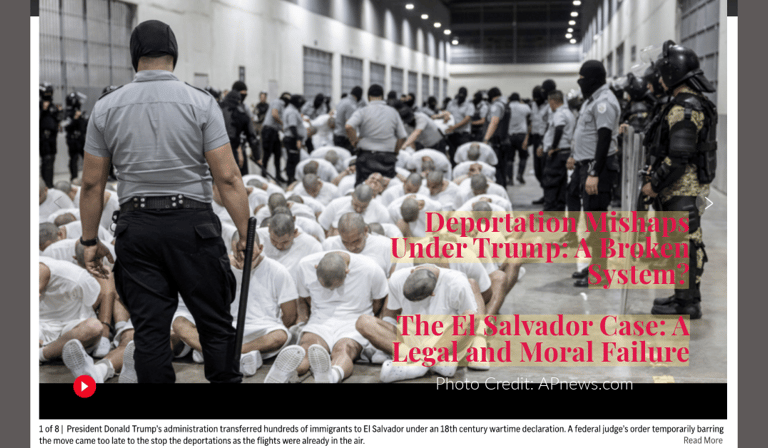Deportation Mishaps Under Trump: A Broken System?
The El Salvador Case: A Legal and Moral Failure
4/18/2025


Deportation Mishaps Under Trump: A Broken System?
On April 17, 2025, the Trump administration’s immigration policies are under fire once again, this time for the wrongful deportation of Kilmar Ábrego García, a Salvadoran man who had legal protection to remain in the U.S. Despite a federal judge’s order to return him, the administration has doubled down, claiming it lacks the power to act—a stance the U.S. Supreme Court unanimously rejected just days ago (Reuters, April 11, 2025). This case isn’t an isolated incident; it’s a glaring symptom of a broken immigration system, one that’s leaving families shattered and raising urgent questions about due process under Trump’s second term. As border enforcement deals with Canada and Mexico tightening, is the U.S. deportation machine out of control?
The El Salvador Case: A Legal and Moral Failure
Kilmar Ábrego García’s story is a nightmare come to life. A Salvadoran migrant living in Maryland with a work permit since 2019, Ábrego García was granted protection from deportation by an immigration judge that same year, citing likely persecution by gangs in El Salvador (BBC, April 4, 2025). Yet, on March 15, 2025, he was deported to El Salvador’s notorious Center for the Confinement of Terrorism (Cecot) prison alongside 238 Venezuelans and 23 other Salvadorans, all accused of gang affiliations (The Guardian, April 14, 2025). The Trump administration later admitted this was an “administrative error,” but the damage was done.
U.S. District Judge Paula Xinis called the deportation “wholly lawless,” ordering Ábrego García’s return by April 7, 2025 (BBC, April 4, 2025). The Supreme Court upheld her ruling, directing the government to “facilitate” his release from El Salvadoran custody (Reuters, April 11, 2025). Yet, during an Oval Office meeting with El Salvador’s President Nayib Bukele, Trump officials—led by policy chief Stephen Miller—misrepresented the court’s order, claiming the U.S. was powerless to act since Ábrego García is in El Salvador’s custody (The Guardian, April 14, 2025). This defiance comes despite the U.S. paying El Salvador $6 million to detain deportees, undercutting their claim of helplessness (Reuters, April 11, 2025).
A Pattern of Deportation Mishaps
Ábrego García’s case isn’t unique—it’s part of a troubling pattern. Just last week, a U.S.-born immigration lawyer in Massachusetts, Nicole Micheroni, received a deportation notice from ICE, despite her citizenship—an error she called a “scare tactic” (The Guardian, April 16, 2025). ICE has arrested 32,000 people since Trump took office, targeting not just undocumented immigrants but also those with legal status who overstay visas or face allegations (NPR, April 7, 2025). The Columbia student deportation case, though less detailed in recent reports, further highlights the administration’s aggressive stance, often bypassing due process (Reuters, February 4, 2025).
These mishaps reveal a system in disarray. ICE’s admission of “administrative error” in Ábrego García’s case points to a lack of oversight, while the administration’s refusal to comply with court orders suggests a disregard for the rule of law. As Eric Welsh, an immigration lawyer, told NPR, “The sands are shifting underneath our feet” (NPR, April 7, 2025). For immigrant communities, that shifting ground feels more like a sinkhole.
Border Enforcement Deals: A Double-Edged Sword
Trump’s immigration crackdown extends beyond deportations to border enforcement deals with Canada and Mexico. On February 4, 2025, he imposed 25% tariffs on both countries for 90 days, but with a catch: they must strengthen border security to curb illegal immigration and fentanyl trafficking (Reuters, February 4, 2025). Canada has since increased patrols in the Swanton Sector, where 19,000 migrants were arrested last year—more than in the previous 17 years combined (CBS News, March 23, 2025). Mexico has deployed additional resources to its northern border, but President Claudia Sheinbaum has warned of retaliation if tariffs return (Reuters, March 5, 2025).
These deals aim to secure the U.S. border, but they’re also displacing the burden onto neighboring countries, straining diplomatic ties. For migrants, the tightened borders mean more dangerous crossings—six Haitians, including a 9-year-old girl, were hospitalized after getting lost in a blizzard near the U.S.-Canada border in January (CBS News, March 23, 2025). The human cost of these policies is mounting, and cases like Ábrego García’s show how easily the system can fail those it’s meant to protect.
A System in Need of Reform
The cost of deportation—both human and financial—is staggering. Estimates vary, but deporting one person can cost thousands, depending on detention and legal battles (NPR, April 7, 2025). DHS’s budget for ICE is $8 billion, yet the system remains “overwhelmed, under-resourced, and outdated,” according to immigration expert Bush-Joseph (NPR, April 7, 2025). Ábrego García’s case, along with others, underscores the need for reform. Without it, more families will be torn apart, and more legal protections will be ignored.
For immigrant communities, the stakes couldn’t be higher. Advocates are calling for greater oversight, transparency, and adherence to due process. Maryland Governor Wes Moore, a Democrat, has urged the administration to “correct its error” in Ábrego García’s case (BBC, April 4, 2025). But with Trump’s team doubling down, the path to justice remains uncertain.
What’s Next?
The El Salvador case is a litmus test for Trump’s immigration policies. Will the administration comply with the Supreme Court and bring Ábrego García home, or will it continue to defy judicial orders? More broadly, can the U.S. fix its deportation system before more lives are upended? As border enforcement tightens and deportation errors multiply, the need for reform has never been clearer.
Thought-Provoking Questions:
Do you think the Trump administration’s deportation errors reflect a systemic failure, or are they isolated mistakes in a complex system?
How should the U.S. balance border security with the protection of legal immigrants’ rights?
What reforms would you propose to prevent cases like Kilmar Ábrego García’s from happening again?
hello@boncopia.com
+13286036419
© 2025. All rights reserved.